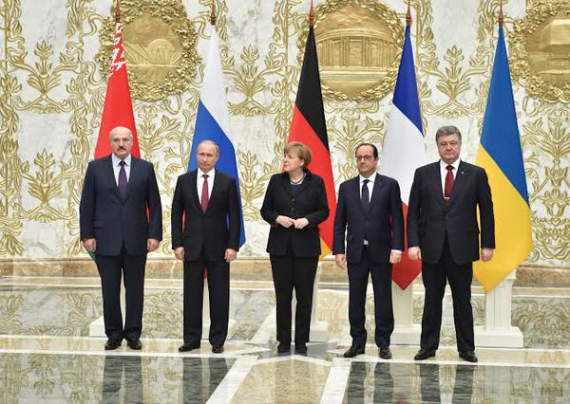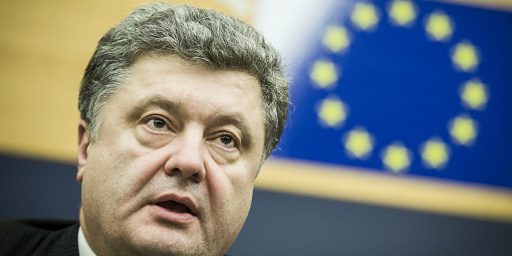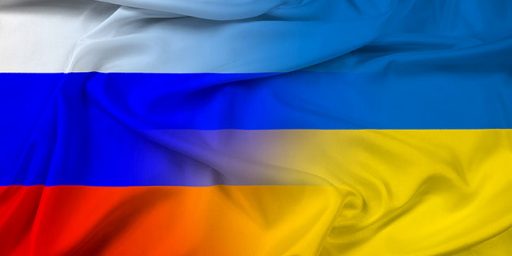Minsk Talks Result In Ukrainian Cease Fire Agreement
A cease fire deal in Ukraine, but a long term settlement will require compromises from both Moscow and Kiev.
A five way meeting in Minsk between representative of Germany, France, Russia, Ukraine and Belarus has resulted in what is being hailed as a cease fire deal for the ongoing war in eastern Ukraine:
MINSK, Belarus — A new cease-fire and an overall compact to end the war in eastern Ukraine was announced here on Thursday by the leaders of France, Germany, Russia and Ukraine after marathon overnight bargaining that threatened to derail the attempt. Even as the agreement was announced, it appeared fragile, with officials on all sides saying that there was more work to be done.
The cease-fire is scheduled to take effect on midnight Saturday, but the fact that the leaders used three separate news conferences to announce the accord suggested a lack of unity. Still, after such a concentrated effort, all the leaders chose to accent the idea that there was at least a chance that the yearlong war could be quieted.
The negotiations “consisted of a long night and a long morning, but we have arrived at an accord on a cease-fire and a global end to the conflict,” President François Hollande of France said. “It is a relief for Europe.”
Mr. Hollande said a broader agreement on ending the war would ultimately hinge on border control and the resolution of questions like the withdrawal of heavy weapons.
The marathon talks meant to quiet the war in Ukraine had appeared to be in doubt on Thursday as the four leaders negotiating the agreement canceled news briefings intended to announce an accord and returned to the negotiating table.
President Vladimir V. Putin of Russia, President Petro O. Poroshenko of Ukraine and Mr. Hollande, along with the German chancellor, Angela Merkel, haggled for more than 15 hours in talks that had begun Wednesday evening.
In the morning, rather than presenting the results at a collective briefing, the Russian and Ukrainian presidents had each planned to address reporters from their countries, while the leaders of Germany and France met with a different set of journalists. Officials had said hours earlier that there would be a joint briefing in the press room of the ornate Independence Palace, where the negotiations have taken place.
The Ukrainian foreign minister, Pavlo A. Klimkin, sent out a tweet not long after dawn, saying that members of some delegations were “literally sleeping,” but that the negotiators for Kiev were still going strong.
The Washington Post has further details and offers some caveats:
The accord offers some concessions to the pro-Russian rebels battling the Western-allied government: a promise that Ukraine would implement constitutional reforms to give rebel-held territories more autonomy.
It also calls for the withdrawal of heavy weaponry at least 30 miles from the front lines – key steps that should calm violence that has spiked in recent weeks and shocked Europe as it faced the bloodiest conflict on its soil since the Balkan wars of the 1990s.
At least 5,400 people have been killed, according to U.N. estimates, and more than a million people have been pushed from their homes.
“We now have a glimmer of hope,” German Chancellor Angela Merkel said. But she also noted that “there are still major hurdles that lie ahead.”
“We have no illusions,” added Merkel, indicating Putin had put pressure on the rebels to accept the cease-fire.
Among the questions in the 13-point deal is how to monitor the border between Russia and rebel-held zones, and whether Ukraine’s Western-backed president, Petro Poroshenko, has the political muscle to carry out its end of the accord.
Poroshenko is likely to face opposition to offer pardons for those involved in the fighting since many government supporters see the rebels as responsible for sparking the violence. Pushing through a new constitution — including offering greater self-rule to rebel regions — also will require broad support from lawmakers in Kiev.
Under the deal, Ukraine also agreed to end an economic blockade of rebel-held territories that has cut off pensions, banking services and the movement of goods and people, a key rebel demand.
On the separatist side, meanwhile, a pledge to disband “all illegal groups” may face stiff resistance.
“We were presented with various unacceptable conditions of withdrawal and surrender,” Poroshenko told reporters after the talks. “We did not agree to any ultimatums and stated firmly that the cease-fire that is announced is unconditional.”
Rebel envoys in Minsk said after the announcement that they were happy about the outcome of the talks.
“This is a major achievement,” said one rebel leader, Igor Plotnitsky. “It will help Ukraine to transform itself, to transform in a civilized manner and to stop killing its own people.”
Yet even the protocols of the accord reflect the complications and doubts.
The agreement was signed by lower-level representatives from the Ukrainian and Russian governments, along with the two top rebel leaders and a delegate from the Organization for Security and Cooperation in Europe, which is charged with monitoring the cease-fire.
But the national leaders themselves did not sign any such deal, and instead supported a non-binding statement of support for peace. That suggested they were not willing to commit fully that the deal would be successful.
On the surface, this sounds like good news. At the very least, it seems like a promising way to bring the latest round of fighting, which has resulted in much bloodshed on both sides, to an end and bring some peace to the daily lives of civilians in the area. At the same time, though, it’s worth noting that we’ve been here before. This agreement isn’t all that different from the accord that was reached in September and was also widely hailed as a major step toward peace in Ukraine. As it turned out, though, that accord was mostly honored in the breach and quickly fell apart as both Ukranian and pro-Russian separatist forces engaged in skirmishes that quickly expanded into wider battles to the point where, by the end of that month, the agreement existed in name only. One issue with that agreement, of course, is that it was not signed off on by representatives of the pro-Russian separatists, but rather by the Russian Federation, so it was unclear from the beginning just how invested they were in that agreement. The fact that this agreement appears to have at least some support from rebel leaders is a hopeful sign that they will be willing and able to live up to their end of the agreement, but that’s obviously rather unclear at this point.
Even if this cease fire holds, of course, it’s only a temporary solution to the longer term problems that have developed in Ukraine over the past year, and which will have to be dealt with if there’s going to be a long-term peace. For better or worse, the rise of the Russian backed separatists in the east has clearly inflamed the nationalist passions of ethnic Russians in that part of the country to an even greater extent than they were prior to that point. If this population is going to continue to exist inside of a more democratic Ukraine, it will likely have to be under a more Federalized political structure that grants greater autonomy to the east than it currently has. Alternatively, it could mean that the two parts of the country decide to go their separate ways. In any case, it will require at least some acceptance of Russia’s historical ties to Ukraine. Additionally, we should dismiss for now the fantasies of Ukraine being part of the EU or NATO. Clearly, Russia sees both of these as provocative acts, and that’s a reaction that ought not to be dismissed out of hand. As it was, there were objections from Moscow when NATO began to expand eastward into the old Warsaw Pact, expanding the alliance literally up to the doorstep of Russia into a nation that, historically, many Russians see as the birthplace of Russia just doesn’t make any sense. Finally, there’s the issue of Crimea. It’s been nearly a year now since Russia annexed the peninsula after an obviously fixed referendum, and while there have been some reports that the transition to Russian rule has been bumpier than expected that transition does seem to be complete. For better or worse, it seems clear that Crimea is now once again part of Russia. Ukraine needs to accept this, and while it may be a hard pill to swallow the reality is that it’s highly unlikely that Ukrainian forces would ever be able to wrest control of the peninsula from Russian hands.
Whether we can get to this peaceful resolution is, of course, an open question and depends largely on the intentions and trustworthiness of the parties involved. Given that we’re talking about Vladimir Putin here, there is of course plenty of reason to be skeptical but it seems worth a try given the fact that all the two sides in Ukraine seem to be accomplishing now is creating greater chaos for the civilian population without either one of them achieving anything approaching a decisive victory.






The view from The Economist ( a view I endorse, FWIW):
Note the Economist approach means substantial financial aid to Ukraine and something like supervision of the Ukrainian political process to ensure the money is properly spent. Dunno if taxpayers in the US and EU are up for that or if the Unrainians would be willing to submit to such supervision. Frankly, even this might not be enough if the Russian seperatists push west to Kiev.One thing is sure-If Putin takes back all of Ukraine, you can be sure the Baltics will be next.
@stonetools:
The idea of sending Western soldiers to fight Russia is so insanely stupid and requires such a high level of ignorance of history, military strategy and international relations, that only a highly paid mainstream pundit can entertain it.
Like seriously, if I had superpowers, I would make Eisenhower’s corpse come of its grave, arm it with a baseball bat, and send it to institute serious beatings to whoever wrote those lines and whomever approved it. Since those fellows don’t serve in the military, and don’t let their children serve in the military, and refuse to pay the taxes required to pay for their GI Joe fantasies, beatdowns by zombies is really the only way for them to feel the horror of what they are proposing.
@humanoid.panda:
Note that the Economist guy does NOT recommend this. He is merely setting up that position in order to refute it.
Lets see how this works out. The Ukrainians wanted a cease fire, as they currently are on the losing end (and in danger to be cut off in a major city). The French and Russians want to conclude their carrier deal, and the Germans don’t want to have to pay for any further aid. Oddly, the only one who don’t gain from the cease fire weren’t invited.
@humanoid.panda:
I believe the Economist author is on the same page as you. S/he is pointing out that those who are advocating for arming Ukraine do not see the long term effects–that if we arm Ukraine, it will escalate, and that will lead to western troops fighting Putin.
So basically, everyone agreed to consolidate Russia’s political control over the territory it’s currently siezed while allowing Russia an operational pause to prepare for it’s next push to sieze more territory.
Don’t want us to get involved, but this ceasefire is a joke. Why bother pretending Putin’s word means anything?
@Neil Hudelson: My apologies to him, but let his words to apply to the people stateside who are gung-ho about doing something to feel better (Lindsey Graham’s actual words!).
Ms. Anne Applebaum over at the WaPo paints a truly dystopian picture of what may happen. Read the whole thing, but here is the conclusion:
Now Applebaum has an axe to grind here. She is Polish, and Poles are born anti-Russian. But given Putin’s history, her analysis isn’t crazy.
@stonetools:
So what is Applebaum’s suggestion to deal with Putin?
I would suggest all that can be done is being done….short of some kind of military action. Military action is a ridiculous thought.
@stonetools:
And by the way…I am of Polish heritage and I could care less about Russia or Ukraine.
Ukraine belonged to Russia for a long time…it’s period of independence is a blip in history. It’s not my problem they could not make it last.
@C. Clavin:
The article sets out a detailed anti-Russian strategy. Read it, please.
It just may be that we are OK with Russia taking back Ukraine. But then comes the question of the Baltics, which were under Russian control for nearly two centuries, and which are frankly a lot less valuable and less defensible than Ukraine . We are obligated by the NATO treaty to defend them, but there is even less of a case to defend them than there is to defend Ukraine in cold realpolitik terms.
@stonetools:
Losing the baltics may not have a realpolitik cost in and of themselves, but bringing every US security guarantee across the entire world into question would have a huge realpolitik cost.
@stonetools:
That’s less a strategy and more a list of tactics…many of which are already being done, as I said…AA mostly calls for more of the above. Which is fine. For instance, sanctions have been ratcheted up…and can be ratcheted up more.
You have to keep in mind that AA is a Neo-Con and was a strong proponent of the invasion and occupation of Iraq. Anything she thinks is subject to second guessing based solely on that insanity.
@stonetools:
@stonetools:
The Baltic States are not only members of NATO, they are also members of the EU.
Even if NATO crumbles, the EU won’t allow any of it members to be invaded, if that happens and the other countries do nothing, then the fallout will be magnitudes higher than if Greece would leave.
So no, the Baltic states will not be next.
At one time, coups were done using guns, and the people who engineered them were deemed evil. Now, coups are done using Facebook and Twitter, and they are called democratic. If it has not become painfully obvious, anybody can engineer a social media coup.
There is no reason why there cannot be a democratic coup in Estonia, and the new government decides to exit NATO. Even funnier would be not exiting but still letting divisions of Russian troops park inside their borders.
I would like to give a special shout out to my old friends: How is Egypt, Libya, Syria, Assad, good Syrian rebels, bad Syrian rebels, Ukraine, and Iran going? Let me help you. Not the way you thought. I guess the crazy old man was not quite as stupid as you 21st century folks thought.
And to whoever said Israel could push a bomb out of a C-130, I am still waiting for that, but I think magic fairy dust for their jet engines would be a better idea.